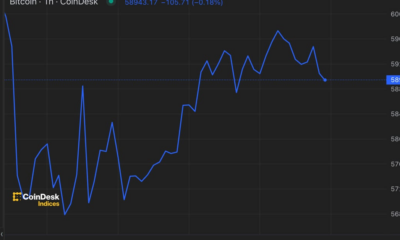News
How SEC Regs Will Change Cryptocurrency Markets

Following the bankruptcies of FTX, BlockFi, Voyager Digital, and other cryptocurrency platforms, the U.S. Securities and Exchange Commission (SEC) ratcheted up its enforcement of anti-fraud and securities regulations in the crypto scene. The results suggest that finding cases wasn’t difficult: in 2023 alone, the SEC took 26 cryptocurrency enforcement actions.
Critics in the industry charge that these moves are overreach. But officials at the financial watchdog say the crypto sector has forced its hand. The SEC says it made these and other recent crypto-related moves to prevent fraud, reduce market manipulation, and force more disclosure from cryptocurrency holders and exchanges. “We have worked thoughtfully and incrementally in this space,” SEC enforcement division director Gurbir Grewal said at a Rutgers University event in mid-2023. After initial investigations and civil actions, “you’d also see compliance” by others, “but we’re not seeing that in this space, so we had to change strategies.”
Below, we guide you through the powers the SEC has over cryptocurrencies, how it has used that authority thus far, and what its stepped-up enforcement within this space means for the future of these digital assets.
Key Takeaways
- The U.S. Securities and Exchange Commission (SEC) has scrutinized many digital currencies as unregistered securities.
- Many crypto issuers are already subject to SEC enforcement.
- SEC Chair Gary Gensler has called on certain crypto exchanges to register with the agency as securities trading platforms.
- Stablecoins and other tokens are also under greater regulatory scrutiny.
- The SEC has brought dozens of enforcement actions against actors in the crypto space, leading its chair to conclude the industry is “rife with abuse.”
Advantages of Cryptocurrency
One reason for cryptocurrency’s enduring popularity is its promise to decentralize money and trade. According to proponents, digital currencies might lead to less control and regulation by entities like the SEC, central banks, and other political institutions. Advocates argue that this, in turn, will lead to a more equitable or “democratic” financial ecosystem. Also, blockchain encourages trust among those in the market without needing external enforcement, as with fiat currencies, since its underlying technology can’t be changed and is transparent to those with the expertise.
There are billions of unbanked or underbanked individuals globally estranged from the conventional banking system because of geographical remoteness or lack of documentation. Cryptocurrencies could allow these individuals to make transactions, save, and access credit. In addition, crypto tends to have lower transaction fees than traditional banking systems, a benefit for individuals and businesses.
That cryptocurrencies offer a new asset class also entices many investors. The meteoric rise in the value of some cryptocurrencies has provided prospects for solid returns, albeit with a lot of volatility. In times of economic uncertainty or lower interest rates, the cryptocurrency market has been considered the place to invest when diversifying a portfolio and hedging against traditional financial market risks.
Reasons for SEC Enforcement of Cryptocurrencies
SEC Chair Gary Gensler has said that some of the major crypto exchanges “are likely trading securities” and thus need to register with the SEC. “When a new technology comes along,” Gensler said, “our existing laws don’t just go away.” Gensler has also urged more enforcement of stablecoins and other crypto tokens.
In 2022, the SEC increased the size of its Cyber Unit by 66%, from 30 to 50 officials, and renamed it the Crypto Assets and Cyber Unit as it expanded its crypto enforcement efforts. The many cases brought after this expansion suggest the unit has its work cut out for it. Notoriously a crypto-sceptic, Gensler has repeatedly told interviewers since the January 2024 launch of spot bitcoin exchange-traded funds (ETFs) that “the whole field is rife with abuses and fraud.”
Cryptocurrencies come under the SEC’s authority if they meet the Howey test. This standard is derived from a 1946 Supreme Court case about orange groves and has since been used to differentiate the sale of securities from other purchases. The court ruled that a contract falls under the SEC’s jurisdiction if someone invests “money in a common enterprise and is led to expect profits solely from the efforts of the promoter or a third party.”
Regulators want to increase protections for investors, keep markets stable, and bring more transparency to a rapidly evolving digital landscape. Here’s a breakdown of the rationale behind the SEC stepping up its enforcement over cases involving cryptocurrencies:
Investor Protection
- Fraud prevention: Cryptocurrency markets are still relatively new and have been associated with many frauds and scams. SEC enforcement could deter fraud and protect investors from bad actors.
- Disclosure standards: By regulating crypto markets under securities laws, the SEC is hoping to make these enterprises provide more accurate and thorough information to the public, enabling investors to make more informed decisions.
Market Integrity
- Price manipulation: The anonymity and lack of regulation in cryptocurrency markets make them susceptible to manipulative practices. SEC oversight could help curb such practices to secure fair prices.
- Market surveillance: Monitoring the crypto markets for unusual activities could help maintain market integrity and investor trust.
Legitimacy and Adoption
- Legal framework: Falling under the SEC’s regulations could legitimize cryptocurrency enterprises and attract more traditional investors and institutions, potentially leading to broader adoption.
- Innovation and competition: By creating a level playing field, SEC enforcement could encourage innovation and competition, which are essential for the crypto sector’s long-term sustainability and growth.
- Money laundering and terrorism financing: By enforcing anti-money laundering (AML) and counterterrorism financing (CTF) regulations, the SEC and other agencies could address two major public concerns about cryptocurrencies.
Regulatory Clarity
- Defining boundaries: The SEC’s involvement could help determine the boundaries between traditional securities and crypto assets, providing much-needed clarity for entrepreneurs and investors.
- Compliance standards: Establishing compliance standards can help crypto enterprises follow widely known regulations and cut legal uncertainties.
- Cross-border collaboration: Cryptocurrencies are without borders, so international cooperation and enforcement could help address challenges common to regulators worldwide.
The Howey Test Meets Crypto
The Howey test is a U.S. legal principle for determining whether a financial arrangement qualifies as an investment contract and is subject to regulatory requirements. The Howey test has become a cornerstone in the SEC’s assessment of various financial instruments and arrangements, including cryptocurrencies and initial coin offerings (ICOs).
The test stems from SEC v. W.J. Howey Co., a 1946 U.S. Supreme Court decision establishing the criteria. The Howey test has become a central one for those in the financial sector, including the burgeoning cryptocurrency space, since it decides what, if any, regulations apply to specific entities. Here are the four criteria under Howey:
- Money is invested: Something of value is put at stake.
- There is a common enterprise: The investment must be in a common enterprise, although courts have had varied interpretations of what that means.
- Those involved hope to profit: At least one of the parties must anticipate potential profits from the investment. This is typically where the efforts of a third party—the promoter or a third party affiliated with the promoter—significantly affect the value of the investment.
- The profits come from the work of another: Essentially, investors are reliant on the actions of others to generate a return on the value they put in.
For example, suppose you invest in a real estate investment trust (REIT), which pools money to buy, manage, and sell real estate. The REIT is managed by a team of real estate professionals, the third party under the Howey test. It decides which properties to buy, how to manage, and when to sell them. Your expectation of a profit largely depends on the real estate expertise and the efforts of this management team. The REIT meets the Howey test criteria because 1) you invested money, 2) your investment is in a common enterprise (the REIT), 3) you set out to profit, and 4) the third party does the work.
So, once the SEC determines a cryptocurrency or token is a security and falls under its regulatory purview, this has far-reaching implications. The issuer must then follow SEC regulations that come with extensive reporting and transparency requirements.
In January 2024, the SEC approved the first 11 spot bitcoin ETFs for trading in the U.S. market, representing the first publicly traded investment funds that were allowed to directly hold cryptocurrencies in their portfolio. Previously, funds could only gain exposure to cryptocurrencies through derivatives, such as futures contracts.
Potential SEC Actions on Crypto
The SEC has a broad set of regulatory tools that can be tailored to address cryptocurrencies’ unique characteristics and challenges. Here are the types of regulations the SEC could adapt to the crypto market:
- Registration requirements: It could mandate the registration of cryptocurrency exchanges and tokens. This would confirm that these platforms and their offerings adhere to the disclosure, reporting, and operational standards of traditional financial entities.
- Disclosure standards: Establishing robust transparency rules could help confirm that crypto enterprises give investors comprehensive and accurate information. This includes publishing details about financials, business operations, and the risks associated with the crypto assets they deal in.
- Anti-fraud and price manipulation measures: The SEC’s enforcement of anti-fraud measures to deter deceptive practices and safeguard the integrity of the crypto markets. This includes rules to curb practices like wash trading and pump-and-dump schemes.
- Investor education and protection initiatives: It could broaden its efforts to apprise investors of the unique risks associated with cryptocurrencies. The SEC could also put in place ways to address investor crypto-related grievances and disputes to boost investor confidence in these markets.
- Cybersecurity regulations: Given the digital nature of cryptocurrencies, imposing rigorous cybersecurity regulations on crypto platforms could help protect these markets against hacks and data breaches.
- AML and CTF regulations: Collaborating with other regulators to enforce AML and CTF regulations to address some of the public security concerns about cryptocurrencies.
- Market surveillance: Monitoring trading activities could help detect irregular activities early, which would help enforce a fair and transparent market.
- Global regulatory cooperation: Given the borderless nature of cryptocurrencies, forging alliances with international regulators to create coordinated regulations could be beneficial. This cooperation could help tackle cross-border crypto crimes and provide a coherent regulatory approach across jurisdictions that makes them easier to follow in the aggregate.
- Innovation-friendly regulations: Adopting a balanced regulatory approach that encourages innovation while protecting investors and market integrity. This includes creating regulatory sandboxes that allow for experimentation and providing regulators with feedback on how they are working.
- Clearer tax guidelines: Providing more straightforward policies on taxing crypto transactions with guidance from the Internal Revenue Service and state tax authorities would remove significant uncertainty for investors and market participants.
If done judiciously, a delicate balance might be struck between the need for innovation and protecting investors, contributing to the healthy growth of the cryptocurrency market.
Recent Crypto Scandals
Criminal activity within the crypto space has long underscored its vulnerability to fraud. Here are some recent high-profile cases:
- The “Bitcoin Beautee” (2024): Xue Lee, known as “Sam Lee,” and Brenda Chunga, known as the “Bitcoin Beautee,” pleaded guilty for their involvement in a crypto pyramid scheme called “HyperFund,” which pulled in more than $1.7 billion from investors worldwide. According to the SEC, from June 2020 through early 2022, Lee and Chunga sold membership packages in the Hyperfund, promising outsized returns from crypto mining and saying they had partnerships with a Fortune 500 company. This was another crypto case where con artists “capitalize[d] on the promise of easy money, without providing the detailed investor protection disclosures required by the registration provisions of the federal securities laws,” according to Grewal, the SEC enforcement director.
- Voyager bankruptcy (2023): Voyager, a New Jersey-based crypto lender, went broke because of the fallout from the liquidation of crypto hedge fund Three Arrows Capital, which defaulted on loans to Voyager totaling $654 million. This put a spotlight on the high-risk nature of crypto lending practices.
- Celebrity and influencer crackdown (2022-2023): The SEC began actions against celebrities and influencers using social media to advertise cryptocurrencies without proper disclosure. In one example, Kim Kardashian came under SEC scrutiny after she touted a crypto asset offered and sold by EthereumMax on social media without saying she was paid to do so. Kardashian ultimately paid a $1.26 million fine to settle the charges.
- Kraken Exchange (2022-2023): The SEC charged Kraken’s parent companies with violating securities laws for not registering its crypto asset staking-as-a-service program. Kraken settled the charges by paying a $30 million fine and discontinuing its staking service for U.S. customers.
- FTX crypto scandal (2022-2023): FTX, once the leading global cryptocurrency exchange, became the face of crypto fraud when its founder and former CEO Sam Bankman-Fried was arrested on behalf of U.S. authorities in the Bahamas on charges of fraud, money laundering, and violating campaign finance laws. FTX quickly went into bankruptcy, and in 2024, Bankman-Fried was sentenced to 25 years in federal prison.
- BlockFi (2022): The SEC charged BlockFi Lending in early 2022 with failing to register its retail crypto lending product, a breach of securities laws, including violations of the registration provisions of the Investment Company Act of 1940. The SEC’s action was the first for retail crypto lending products. BlockFi settled with the SEC to resolve the charges and was fined $100 million.
- Mining Capital Coin (MCC) (2022): The CEO of MCC, Luiz Capuci Jr., was indicted in March 2022 for orchestrating a $62 million fraud scheme through a purported cryptocurrency mining and investment platform while diverting investors’ money into crypto wallets under his control.
Historical Crypto Cases
The cryptocurrency sector has had high-profile scandals since the beginning. Here’s an overview of some of the major ones:
- Quadrigacx scandal (2019): The crisis for Quadrigacx, a Canadian cryptocurrency exchange, was set off when its CEO, Gerald Cotten, who said he had sole access to the exchange’s funds, died in December 2018, leaving over $190 million in cryptocurrency inaccessible to investors. At that point, the exchange couldn’t fulfill customer withdrawal requests, and in January 2019, the exchange filed for bankruptcy. A later investigation by Ernst & Young found that Cotten had operated the exchange through pseudonymous accounts and had transferred customer funds into his personal accounts.
- Coincheck hack (2018): In a security breach, hackers stole over $530 million worth of NEM tokens from the Japanese cryptocurrency exchange Coincheck. The heist underscored how crypto exchanges were still vulnerable to such attacks.
- BitConnect scam (2017): BitConnect, operating as a lending platform, was a Ponzi scheme, causing financial losses estimated at $2.4 billion and the platform’s closure.
- OneCoin scam (2017-ongoing): Founded in 2014 by Ruja Ignatova in Bulgaria, OneCoin is estimated to have defrauded around $25 billion from investors. Ignatova disappeared in 2017, and OneCoin’s other co-founder was found guilty of fraud and sentenced to 20 years in federal prison.
- Bitfinex hack (2016): Bitfinex, a popular cryptocurrency exchange, had a security breach resulting in the theft of almost 120,000 bitcoins. The platform responded by dividing the losses among its users, illustrating the risks borne by users of crypto platforms. A New York City couple pleaded guilty to sharing the proceeds from the hack, whose proceeds were worth about $4 billion in U.S. dollars at the time of their sentencing in 2023. $3.6 billion in bitcoin was subsequently recovered.
- DAO hack (2016): Maker DAO, a decentralized autonomous organization (DAO) or investor-directed venture capital fund based on Ethereum, was attacked by those exploiting a vulnerability in its code, leading to a loss of over 3.6 million in ether. This hack led to a hard fork in the Ethereum crypto network to recover the funds, creating two blockchains, one following the “classic” currency and another for Ethereum going forward.
- Mt. Gox (2014): Mt. Gox, once the world’s largest Bitcoin exchange, filed for bankruptcy in 2014 after losing 850,000 Bitcoins (worth approximately $460 million at the time) in a hacking attack. The event highlighted the security vulnerabilities faced by crypto exchanges.
Although sometimes marketed as collectibles, artworks, or in-game objects, non-fungible tokens (NFTs) may be subject to securities laws if they are bought as investments.
Aspects of the Crypto Market Open to Regulation
Regulators globally grapple with framing rules that balance innovation with consumer protection and market integrity in the crypto markets. Here’s a glimpse into various market segments and how regulations might apply:
- Cryptocurrencies like Bitcoin: The pioneer and most recognized cryptocurrency, Bitcoin could have regulations focusing on its use as a currency or a commodity.
- Utility tokens: Utility tokens provide access to a product or service within a blockchain-based platform. Regulations could determine which tokens are veiled securities and follow consumer protection laws.
- ICOs: Akin to initial public offerings in the crypto space, ICOs have been scrutinized for bypassing traditional securities regulations. Regulations might confirm proper disclosures and better investor protection and anti-fraud provisions.
- NFTs: These come with ownership or proof of authenticity for a unique item using blockchain. Regulations could have to do with requiring provenance verification, intellectual property rights, and classification as securities.
- DAOs: DAOs work through smart contracts on a blockchain, enabling collective and automated decision-making. Regulations might register them as securities to address governance and liability issues.
- Stablecoins: Often pegged to traditional fiat currencies or other assets, these have gained wider attention because they can lower the volatility often associated with cryptocurrencies. Regulations could cover reserve management, disclosure practices, and treating some exchanges as banks. Backers of Tether (USDT), the largest stablecoin, paid $18.5 million in a settlement with the New York attorney general in 2021 and incurred a $41 million fine from the Commodity Futures Trading Commission the same year over allegations they misrepresented its reserves. Tether now publishes limited details about its reserves holdings daily.
- Crypto exchanges and wallets: These platforms support the buying, selling, and storing of cryptocurrencies. Regulations might focus on ensuring better AML and CTF measures, cybersecurity protocols, and consumer protection. Exchanges, for example, might have to register as broker-dealers and subject themselves to SEC oversight. If registered with the SEC, crypto exchanges would have to adopt their technology to be audit-compliant. They would also face strict rules on order execution to prevent market manipulation.
- Crypto lending and decentralized finance (DeFi) platforms: Regulations could address licensing, consumer protection, and ensuring DeFi platforms and crypto lending ventures follow AML and CTF laws.
- Crypto asset management: Managing crypto assets on behalf of investors involves navigating a complex regulatory environment, potentially requiring compliance with securities laws and other financial regulations.
- Cross-border transactions: Given the global nature of the crypto market, finding a way to smooth out regulatory differences across different states through international cooperation could help subvert illicit activities.
Each of these present distinct challenges for regulators. As the crypto market evolves, adaptable and well-thought-out regulations could encourage consumer protection while not doing away with the financial change for which the sector is known.
Regulation and Crypto ETFs
Crypto ETFs are pooled investments that track crypto markets but are traded like shares on stock exchanges and are accessible through brokerage platforms. ETFs offer several benefits over other investments, such as debt-based exchange-traded products (ETPs) or investment trusts that were previously approved for cryptocurrencies. ETFs are regulated under the Investment Company Act of 1940, which provides more investor protection and transparency than ETPs or trusts. ETFs also offer greater liquidity since they can be easily bought and sold on stock exchanges throughout the day, and they often have lower fees than other investment products.
The first regulated funds in the U.S. based on crypto were futures-based bitcoin and ether (ETH) ETFs. They invest in bitcoin or ETH futures contracts traded on U.S. exchanges. Futures-based ETFs provide investors with indirect exposure to cryptocurrency price moves without the need to directly own or store the underlying assets. However, futures-based ETFs may not perfectly track the spot price of the cryptocurrency because of rolling costs and other factors.
ETFs are an equity-like subset of ETPs. In the context of crypto markets, an ETP would refer to debt securities issued by an entity that owns crypto assets, which are used as collateral backing the value of the ETP shares.
A spot bitcoin or Ether (ETH) ETF—only the former has been approved—directly hold the underlying cryptocurrency, providing investors with direct exposure to the spot price. Spot ETFs are desirable because they are a more direct and lower-cost way to invest in cryptocurrencies, eliminating the complexities of investing in futures-based products. In addition, spot ETFs make it easier for institutional and retail investors to gain exposure to cryptocurrencies through their traditional brokerage accounts.
In early 2024, the SEC approved the first spot Bitcoin ETFs, which were under pressure from a 2023 court ruling in their first months. However, the SEC is still reviewing applications for spot ether ETFs, and will need to address concerns over Ethereum’s proof-of-stake consensus mechanism and ETH’s possible classification as a security before approval.
Does the SEC Regulate Cryptocurrency?
If a cryptocurrency meets the criteria to be an investment contract, the SEC requires it to be registered as an investment. It will therefore come under SEC regulation. If it is offered to institutional investors, it is considered an investment contract and must also be registered.
Is Coinbase in Trouble With the SEC?
In June 2023, the SEC filed a complaint with the Southern District of New York against Coinbase for operating as an unregistered exchange. While ongoing, the lawsuit is seen as setting a precedent for regulating crypto exchanges and the broader cryptocurrency market. If the SEC’s allegations are upheld, it could alter Coinbase’s operations and have wider implications for the wider cryptocurrency industry. The lawsuit has already triggered a spike in withdrawals by Coinbase users.
Is Crypto Regulated by the SEC or Commodity Futures Trading Commission?
The way a particular cryptocurrency is regulated and by which regulator depends on how it is offered to investors. The SEC regulates it if it meets the criteria to be an investment contract, and the Commodity Futures Trading Commission regulates it if it is offered as a tradable commodity or derivatives contract.
The Bottom Line
While announcing its settlements with crypto exchanges, the SEC has gone out of its way to emphasize its willingness to work with cooperative industry participants. The goal, Gensler has said, is to extend to crypto the investor protections that have ensured the success of U.S. securities markets. The growing number of regulatory settlements by cryptocurrency companies suggests that the message is starting to resonate.
The comments, opinions, and analyses expressed on Investopedia are for informational purposes only. Read our warranty and liability disclaimer for more info.
News
Ether Drops Further After ETF Launch

Key points
- Spot ether ETFs began trading in the U.S. today, with the funds initially having more than $10 billion in collective assets under management.
- Analysts expect the launch of spot ether ETFs to have a net negative impact on the underlying price of ether in the near term, due to expected outflows from the pre-existing Grayscale Ethereum Trust.
- Spot Bitcoin ETFs continue to see strong inflows, with BlackRock’s IBIT alone seeing more than $500 million in inflows on Monday.
- Franklin Templeton, a spot ETF issuer on bitcoin and ether, has invested in a project that intends to bring Ethereum technology to Bitcoin.
Nine-point ether exchange-traded funds (ETFs)) started trading on the stock market on Tuesday, but all the optimism ahead of their approval did not translate into gains for the cryptocurrency markets.
Ether (ETH), the native cryptocurrency of the Ethereum blockchain, dropped less than 1% around the $3,400 level as of 1:30 PM ET, while Bitcoin (BTC) fell more than 2% to around $66,000.
Ether ETFs’ Debut Isn’t as Flashy as Bitcoin ETFs’
Spot ether ETFs began trading at just over $10 billion assets under management (AUM)), according to Bloomberg Intelligence analyst James Seyffart, most of that money is in the current Grayscale Ethereum Trust (ETHE) which has now been converted into an ETF.
“In the long term, Grayscale will simultaneously have the highest and lowest fees in the market. The asset manager’s decision to keep its ETHE fee at 2.5% could lead to outflows from the fund,” Kaiko Research said in a note on Monday.
Outflows from ETHE, if they occur, would be similar to those faced by Grayscale’s Bitcoin Trust (GBTC) after spot bitcoin ETFs began trading in January of this year, most likely due to high fees for the two original funds. Grayscale’s existing fund charges 2.5% fees, while a new “mini” ether ETF will charge 0.15% and commissions for other ETFs are set at 0.25% or less.
Such outflows could impact the price of ether and market sentiment.
“There could be a pullback shortly after the launch of Ethereum spot ETFs, i.e. outflows from Grayscale Ether Trust could dampen market sentiment in the short term,” Jupiter Zheng, a partner at Hashkey Capital’s liquid fund, told The Block.
But Grayscale remains optimistic.
“Compared to the splashy debut of spot bitcoin ETPs in January, the launch of ethereum ETPs has been relatively muted,” said Zach Pandl, Grayscale’s head of research, adding that investors may be “undervaluing” ether ETFs that are “coming to the U.S. market in tandem with a shift in U.S. cryptocurrency policy and the adoption of tokenization by major financial institutions.”
Bitcoin ETF Inflows Continue to Rise
As for bitcoin, there is clearly no lack of demand for spot ETFs, such as BlackRock’s iShares Bitcoin Trust (IBITS) recorded its sixth-largest day of inflows in its short history on Monday, at $526.7 million, according to data from Farside Investors. Daily inflows for the overall spot bitcoin ETF market also hit their highest level since June 5.
In particular, asset manager Franklin Templeton, which has issued both bitcoin and ether ETFs, appears to have decided to cover its back when it comes to Ethereum by investing in Bitlayer, a way to implement Ethereum technology on a second-layer Bitcoin network, according to CoinDesk.
News
Spot Ether ETFs Start Trading Today: Here’s What You Need to Know

Key points
- Spot ether ETFs will begin trading on U.S. exchanges on Tuesday. Nine ETFs will trade on Cboe BZX, Nasdaq and NYSE Arca.
- Ether ETFs offer investors exposure to the price of their underlying assets.
- Commissions on these new ETFs generally range from 0.15% to 0.25%.
- These ETFs do not provide exposure to Ethereum staking.
The U.S. Securities and Exchange Commission (SEC) has officially approved nine ether spots (ETH)exchange-traded funds (ETFs) for trading on U.S. exchanges. Trading for these new cryptocurrency investment vehicles begins today. Here’s everything you need to know.
What new ether ETFs are starting to trade today?
Spot ether ETFs starting trading today can be found at Quotation, NYSE Arkand Cboe BZX. Here’s a breakdown of each ETF you can find on these three exchanges, along with the fund tickers:
Cboe BZX will list the Invesco Galaxy Ethereum ETF (QETH), the 21Shares Core Ethereum ETF (CETH), the Fidelity Ethereum Fund (FETH), the Franklin Ethereum ETF (EZET) and the VanEck Ethereum ETF (ETHV).
Nasdaq will have the iShares Ethereum Trust ETF (ETHA) created by BlackRock, which also operates the largest spot bitcoin ETF under the ticker IBIT.
NYSE Arca will list the Bitwise Ethereum ETF (ETHW) and the Grayscale Ethereum Trust (ETHE). The Grayscale Ethereum Mini Trust (ETH), which will begin trading on the same exchange.
How does an ether ETF work?
Spot ether ETFs are intended to offer exposure to the price of ether held by the funds. Ether is the underlying cryptocurrency of the Ethereal network, the second largest crypto network by market capitalization.
ETF buyers are buying shares of funds that hold ether on behalf of their shareholders. Different spot ether ETFs use different data sources when it comes to setting the price of ether. Grayscale Ethereum Trust, for example, uses the CoinDesk Ether Price Index.
None of the ETFs launching today include pointed etherwhich represents a potential opportunity cost associated with choosing an ETF over other options such as self-custody or a traditional cryptocurrency exchange.
Ether staking currently has an annual return of 3.32%, according to the Compass Staking Yield Reference Index Ethereum. However, it is possible that the SEC will eventually approve Ether staking held by ETFs.
How can I trade Ether ETFs?
ETFs can simplify the trading process for investors. In the case of cryptocurrencies, instead of taking full custody of the ether and taking care of your own private keysSpot ether ETFs allow investors to purchase the cryptocurrency underlying the Ethereum network through traditional brokerage accounts.
Today, not all brokers may offer their clients spot ETFs on cryptocurrencies.
What are the fees for ether ETFs?
The fees associated with each individual spot ether ETF were previously revealed In the S-1 OR S-3 (depending on the specific ETF) deposit associated with the offerings. These fees are 0.25% or less for all but one.
The Grayscale Ethereum Trust, which converts to an ETF, has a fee of 2.5%. The Grayscale Mini Ethereum Trust has the lowest fee at 0.15%. These fees are charged on an annual basis for the provider’s management of the fund and are in line with what was previously seen with spot bitcoin ETFs.
Brokers may also charge their own fees for cryptocurrency trading.
News
Kamala Harris Odds Surge Amid $81M Fundraise. What Does It Mean for Bitcoin and Cryptocurrencies?

Market odds and memecoins related to US Vice President Kamala Harris have soared as the latest round of donations tied to the Democratic campaign raised $81 million in 24 hours, bolstering sentiment among some traders.
The odds of Harris being declared the Democratic nominee have risen further to 90% on cryptocurrency betting app Polymarket, up from 80% on Monday and setting a new high.
Previously, in early July, bettors were only betting on 8%, but that changed on Saturday when incumbent President Joe Biden announced he would no longer run in the November election. Biden then approved Harris as a candidate.
Polymarket traders placed $28.6 million in bets in favor of Harris, the data showsThe second favorite is Michelle Obama.
Somewhere else, Memecoin KAMA based on Solanaa political meme token modeled after Harris, has jumped 62% to set a new all-time high of 2 cents at a market cap of $27 million. The token is up a whopping 4,000% from its June 18 low of $0.00061, buoyed primarily by the possibility of Harris becoming president.
As such, Harris has yet to publicly comment on cryptocurrencies or her strategy for the growing market. On the other hand, Republican candidate Donald Trump has expressed support for the cryptocurrency market and is expected to appear at the Bitcoin 2024 conference on Saturday.
However, some expect Harris or the Democratic Party to mention the sector in the coming weeks, which could impact price action.
“While he has not yet received the official nomination, there is consensus that last night’s development is in line with current Democratic strategy,” cryptocurrency trading firm Wintermute said in a Monday note emailed to CoinDesk. “Keep an eye on Democrats’ comments on this issue in the coming days.
“The prevailing assumption is that Harris will win the nomination and any deviation from this expectation could cause market volatility,” the firm added.
News
Top 30x Cryptocurrency and Coin Presales Today: Artemis Coin at #1, Others Are: BlockDAG, 99Bitcoin, eTukTuk, and WienerAI

The cryptocurrency market has seen a lot of growth and imagination lately, with new ventures popping up regularly. A critical pattern in this space is the rise of crypto pre-sales, which give backers the opportunity to get involved with promising projects early on. Artemis is a standout option for crypto investors looking to expand their portfolios amid the many pre-sales currently underway.
Cryptocurrency presales, commonly referred to as initial coin offerings (ICOs), allow blockchain ventures to raise capital by offering their local tokens to early backers before they become available on open exchanges. Investors can take advantage of these presales by purchasing tokens at a lower price. If the project is successful and the token’s value increases, investors stand to receive significant returns.
>>> Explore the best cryptocurrency pre-sales to buy now <<
The Ultimate List of the Top 5 Cryptocurrency Pre-Sales to Invest In
- Artemis: The aim of Artemis (ARTMS) will become the cryptocurrency equivalent of eBay or Amazon. The upcoming Phase 4 will see the launch of the Artemis Framework, which will serve as a stage for digital money exchanges where buyers, sellers, specialized organizations and those seeking administration can participate in coherent exchanges.
- DAG Block: uses Directed Acyclic Graph technology to increase blockchain scalability.
- 99bitcoin: operates as a crypto learning platform
- WienerAI uses AI-powered trading bots for precise market analysis.
- eTukTuk focuses on environmentally sustainable transportation options, such as electric vehicle charging infrastructure.
We have determined that Artemis is the best new cryptocurrency presale for investment after conducting extensive research. It presents itself as the unrivaled cryptocurrency presale choice currently open.
>> Visit the best cryptocurrency pre-sale to invest in now <<
Top 5 Crypto Pre-Sales and Best Cryptocurrencies for Investment Today
Artemis (ARTMS) is attempting to establish itself as the cryptocurrency version of eBay or Amazon. The Artemis Crypto System, which will act as a platform for cryptocurrency transactions, will be launched in Phase 4. Buyers, sellers, service providers, and requesters will all benefit from seamless trading with this system. Customers will be able to purchase things, such as mobile phones using digital money, as well as sell products such as involved bicycles and get paid in cryptocurrency. Additionally, crypto money can be used to pay for administrations such as clinical consultations, legitimate care, and freelance work. Artemis Coin will act as the main currency of the ecosystem, with Bitcoin and other well-known cryptocurrencies from various blockchain networks backing it.
Artemis Coin has increased in price from 0.00055 to 0.00101 from 0.00094. Artemis may be attractive to individuals looking to recoup losses in Bitcoin, as predicted by cryptocurrency analysts. At this point, it seems to present an interesting presale opportunity.
>>> Visit the best cryptocurrency pre-sale to invest in now <<
The world of digital currency pre-sales is an exciting and exciting opportunity that could open the door to game-changing blockchain projects. Projects in this article, like Artemis Coin, offer the opportunity to shape the future of various industries and the potential for significant returns as the industry develops.
However, it is imperative to approach these investments with caution, thorough research, portfolio diversification, and awareness of the risks. You can explore the digital currency pre-sale scene with greater certainty and increase your chances of identifying and profiting from the most promising venture opportunities by following the advice and methods in this article.
>>> Join the best cryptocurrency pre-sale to invest in now <<
-

 News1 year ago
News1 year agoBitcoin (BTC) price recovery faces test on non-farm payrolls
-

 Bitcoin12 months ago
Bitcoin12 months ago1 Top Cryptocurrency That Could Surge Over 4,300%, According to This Wall Street Firm
-

 Altcoins12 months ago
Altcoins12 months agoOn-chain data confirms whales are preparing for altcoin surge with increased buy orders
-

 Bitcoin12 months ago
Bitcoin12 months agoThe US government may start accumulating Bitcoin, but how and why?
-

 News1 year ago
News1 year agoNew ByBit Listings for 2024: 10 Potential Listings
-

 News1 year ago
News1 year ago11 Best Crypto TikTok Accounts & Influencers in 2024
-

 Altcoins1 year ago
Altcoins1 year agoMarket giants have taken action!
-

 News1 year ago
News1 year ago11 Best Shitcoins to Buy in 2024: The Full List
-

 Ethereum1 year ago
Ethereum1 year agoTop Meme Coins by Market Capitalization in 2024
-

 News1 year ago
News1 year ago1.08 Trillion SHIBs Dumped on Major Crypto Exchange, What’s Going On?
-

 News1 year ago
News1 year ago19 Best Crypto Games to Play in 2024
-

 Altcoins1 year ago
Altcoins1 year agoAltcoin Recommended by Crypto Expert for Today’s Portfolio





